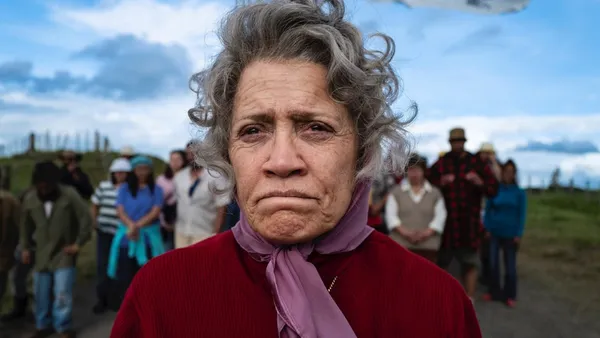Eye For Film >> Movies >> Whina (2022) Film Review
Whina
Reviewed by: Amber Wilkinson

If there’s a story that deserves a biopic it is certainly that of Māori trailblazer Dame Whina Cooper, who variously took on the patriarchy, the Catholic Church, the Pākehā (the Māori name for the European settlers) and the government over the course of her 98 years – a fight for rights and recognition that continues today, with an ongoing debate about changing the name of New Zealand back to its Te Reo Māori title Aotearoa. Here Whina is given very well-appointed and loving treatment in a story that’s so powerful it rises above the filmmakers’ more sentimental tendencies.
The film hinges on the historical Māori Land March in 1975, which Whina led at the age of 80 and despite her arthritis, beginning in North Island and ending in Wellington, almost 700 miles and a month later, epitomised by one of its key slogans: “Not one more acre of Māori land.” This march, and the way it gathered people as it went, is not only recreated but, ultimately, mixed with archive footage to give a true size of the scale and spirit of the protest as it reached its destination.

In between, the film flashes back to key moments in Whina’s life, beginning with the surprise at her birth, when on discovering she was not the expected boy, her name was quickly switched from Joseph to Josephina. Being a girl may have held her back in the eyes of many but her father still chose to make her ‘chief’ and the film passes quickly through her formative years (played by Tioreore Ngatai-Melbourne), pausing just long enough to underline her determination to stand tall in the face of adversity. The casting is key to the film’s success and Miriama McDowell and, particularly, Rena Owen, bring a steely resolve to Whina, with Owen adding a more ruminative element to her character that gives the sense of shifting emotions across the life she lived.
Inevitably, when faced with such a busy life, corners have to be cut for the sake of filmmaking and meat of the movie comes after Whina was already married to her first husband Richard (Richard Te Are), with children, and making her presence felt as an advocate for her community. This advocacy leads her path to cross that of William Cooper (Vinnie Bennett), a land consolidation officer, a liaison that would again alter the path of Whina’s life. Whina’s incredible story lends itself towards the Barbara Taylor Bradford treatment and writer/directors James Napier Robertson and Paula Whetu Jones (co-writing with James Lucas) do lean into this romantic element rather heavily at the mid-point of the film. You can’t help but wonder if Whina had been a man, if quite so much time would have been spent on this element.
Once the second marriage with Cooper has been fully established, however, the film hits its stride convincingly as it shows how her march for Māori rights was much longer and began a hell of a lot sooner than 1975, which the film rightly indicates was as much a culmination of a lifetime of her efforts as it was the beginning of a new movement.
Reviewed on: 14 Aug 2022

















